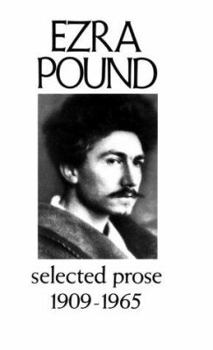Selected Prose 1909-1956
Select Format
Select Condition 
Book Overview
In making this selection, writes William Cookson in his introduction to this paperback edition of early and out-of-print writings, my aim has been to show the unity of Ezra Pound's concern. The... This description may be from another edition of this product.
Format:Paperback
Language:English
ISBN:0811205746
ISBN13:9780811205740
Release Date:January 1973
Publisher:New Directions Publishing Corporation
Length:484 Pages
Weight:1.05 lbs.
Dimensions:1.3" x 5.2" x 7.9"
Customer Reviews
2 ratings
Uncovering or rediscovering the unsainted.
Published by Thriftbooks.com User , 16 years ago
Inarguably America's most prolific poet and essayist, Pound is probably the most influential of all American poets and possibly the best. This collection of essays gives a more representative view of the complete thinker in all fields of knowledge than does the collection assembled by T. S. Eliot. Pound comes out of the line of Donne and Browning--more musician than painter, more an inhabitant of time than of space, an awesome organic discourse machine (before word-processing, even!), whose syntactical energies, whether in verse or prose, are always fascinating if not compelling (the "content" is another matter). Having survived Browning's Sordello (which I'm unconvinced Pound did, or he wouldn't be making ridiculous statements about moving on to a more "modern" form of poetic discourse), I thought I'd give its offspring some of my time. Too many discussions of Pound simply apologize quickly and awkwardly for his anti-semiticism, and move on. Given all the "suspected" and covert anti-Semites in the arts, give Pound credit, at least, for the courage of his convictions (like a suicide bomber), regardless of how wrong-headed they were. Also, it may be necessary to give more attention to his writings in this area (admittedly often ramblings) to come to a better understanding of the most notoriously difficult poem by an American poet, "The Cantos." Pound obsesses on the subject of "usury" for a hundred or more pages in this prose collection, enough to allow the reader to see in greater clarity the connection between the American and Italian authors of literature's two most famous "Cantos," since Dante provides a place for usurers in the eighth, penultimate circle of The Infernal. Pound's view of modern economics, of course, is wildly reactionary and hopelessly fantastical in addition to the unfortunate (especially for him) scapegoating and personified demons that it gave rise to--whether metaphorical, literal, or a mixture of both often hard to say, though the effect remains the same: Pound's ranting against usury and its practitioners led to his being viewed not merely as anti-semitic, anti-free enterprise, unpatriotic, but criminally insane; similarly, D. H. Lawrence's incessant (and insistent) preaching about the glories of sex and his denunciation of all things WASPish led to his being branded little more than a pervert if not a dirty old man. In both cases, it's not sufficient to ignore or "excuse" the distasteful parts. Without such dispositions, excesses, obsessions, etc., neither writer would have been the artist he was. In fact, perhaps with the exception of the few inferior creators who pass Tolstoy's morality test, bid the artist and his art goodbye. Commerce will always manage to fill the void.
Much great prose
Published by Thriftbooks.com User , 18 years ago
I love a lot of the writing in this book: Pound's obit for Eliot, the opening note, the essays on Confucius and Mencius, the essay on Adams and Jefferson, etc. Robert Anton Wilson also highly recommends this book.




